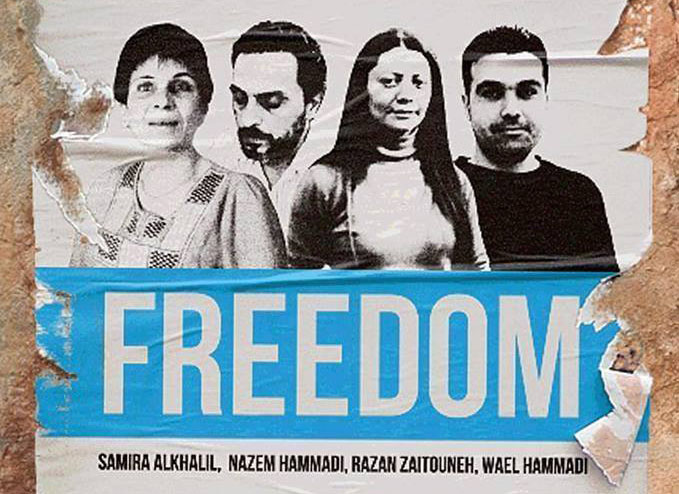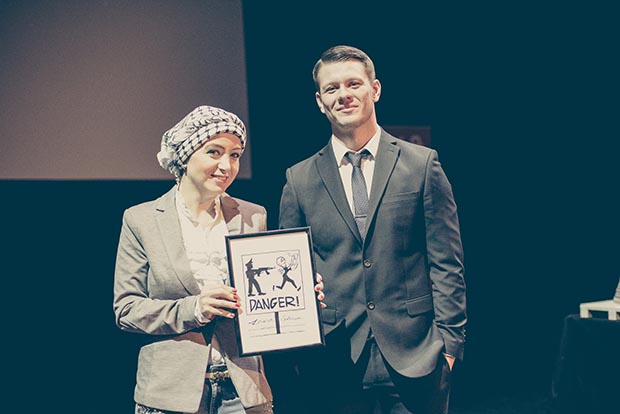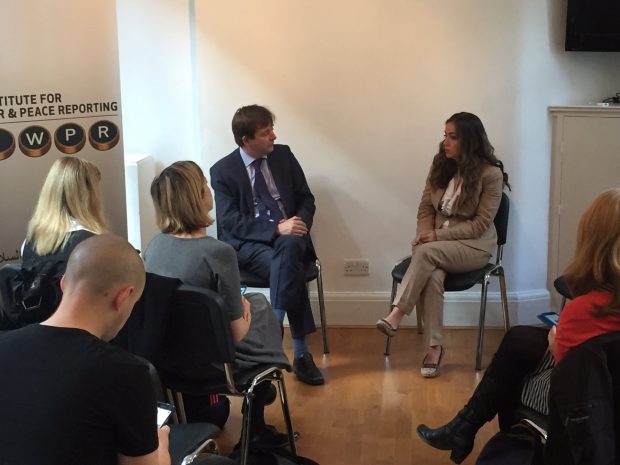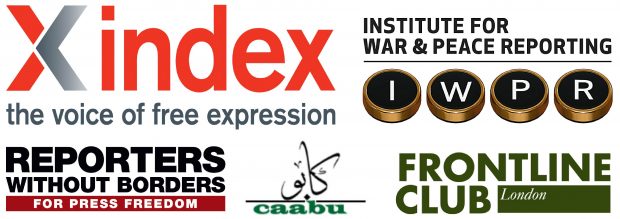Index relies entirely on the support of donors and readers to do its work.
Help us keep amplifying censored voices today.
 Prominent human rights defenders Razan Zaitouneh, Samira Al-Khalil, Wa’el Hamada and Nazim Hammadi – the Douma four – should be released immediately, 32 human rights organisations said today, on the third anniversary of their abduction.
Prominent human rights defenders Razan Zaitouneh, Samira Al-Khalil, Wa’el Hamada and Nazim Hammadi – the Douma four – should be released immediately, 32 human rights organisations said today, on the third anniversary of their abduction.
On 09 December 2013, a group of armed men stormed into the office of the Violations Documentation Centre in Syria, a local human rights monitoring group in Douma, in Damascus Countryside, and abducted Razan Zaitouneh, the head of centre, her husband, Wael Hamada, and colleagues- Samira Al-Khalil and Nazem Hamadi. There has been no news of their whereabouts since then.
The armed groups exercising de facto control over Douma include the Army of Islam, which is part of the Islamic Front, a coalition of armed groups. The groups should immediately release the four human rights defenders if they are in the groups’ custody, or work toward ensuring they are released unharmed and without delay. Countries that support these groups, as well as religious leaders and others who may have influence over them, should also press for the immediate release of the four activists and for an end to abductions of civilians.
Razan Zaitouneh defended political prisoners in Syria since 2001 and has played a key role in the promotion and protection of human rights through her brave work as a lawyer, activist and journalist. Since the beginning of the crisis in 2011, Razan Zaitouneh has played a key role in efforts to defend human rights for all and protect independent groups and activists in Syria. Along with a number of other activists, she established the VDC, which monitors human rights violations and records casualties in Syria, and co-founded the Local Coordination Committees, which coordinates the work of local committees in various cities and towns across Syria. She also established the Local Development and Small Projects Support Office, which assists non-governmental organisations in besieged Eastern Ghouta. As a result of her work, she received threats from the Syrian government and armed opposition groups in Douma several months before her abduction.
Samira Khalil has been a longtime political activist in Syria. The Syrian government had detained her between 1987 and 1991 for her activism. She later worked in a publishing house before shifting her efforts to working with the families of detainees and writing about detention in Syria. Before her abduction, she was working to help women in Douma support themselves by initiating small income generating projects.
Wael Hamada was also an activist before the 2011 uprising in Syria. When peaceful protests first broke out in the country in 2011, the government detained and later released Hamada. He is an active member and co-founder of the Local Coordination Committees and the VDC. Before his abduction, Wael Hamada was working to provide desperately needed humanitarian assistance to the residents of besieged Eastern Ghouta.
Nazim Hammadi, a lawyer and poet, was one of the most prominent volunteer defenders of political prisoners before and after the 2011 uprising in Syria. He contributed to founding the Local Coordination Committees and also worked to provide humanitarian assistance to residents of Eastern Ghouta.
Razan Zaitouneh and her colleagues appear to have been abducted and arbitrarily deprived of their liberty as punishment for their legitimate activities as human rights defenders. Such actions are prohibited by international humanitarian law and are contrary to international human rights standards. The armed groups in control of the area and the governments who support them should do everything in their power to facilitate the release of Razan Zaitouneh, Wa’el Hamada, Samira Al-Khalil and Nazem Hamadi.
List of signatories:
[vc_row][vc_column][vc_column_text]

2016 Freedom of Expression Journalism Award winner Zaina Erhaim and Jake Hanrahan of Vice News (Photo: Elina Kansikas for Index on Censorship)
“The world is travelling in two directions: one is towards the narrowing of distances through travel, increasing interchange… the other is towards the shutting down of frontiers, the ever more jealous surveillance by governments and police of individual freedom.”
So wrote poet and Index founder Stephen Spender in 1972 – in the very first edition of Index on Censorship magazine. Four decades later, we take the same view as we did then: that faced with those who want to silence us, we must fight so all voices can be heard.
With your help, each year we are able to support more writers, journalists and artists at the free speech front line – wherever they are in the world – through Index Fellowships. These remarkable individuals risk their freedom, their families and even their lives to speak out against injustice, censorship and threats to free expression.
Your donation is needed to provide the bespoke assistance, training and public recognition that these outstanding individuals need to ensure their voices continue to be heard, despite the restrictions under which they are forced to live and work.
Your support will help award winners like Zaina Erhaim, the Syrian journalist who returned to Syria after war broke out to help train female citizen journalists. Index arranged for Zaina to headline at an event with veteran journalist Kate Adie earlier this year and campaigned on Zaina’s behalf after British authorities seized her passport.
“I can’t thank you enough for all the efforts you have put in to help me in the latest crisis. Feeling supported is surely the most effective cure for any problem a Syrian like me might face,” Zaina wrote after departing the UK.[/vc_column_text][/vc_column][/vc_row][vc_row][vc_column][vc_btn title=”Donate to Index on Censorship via your credit card or Paypal account.” color=”danger” size=”lg” align=”center” link=”url:https%3A%2F%2Fwww.indexoncensorship.org%2Fsupport-index-donate-now-annual-appeal%2F|||”][/vc_column][/vc_row]

Credit: Joseph Willits, Caabu
Journalist Zaina Erhaim says the Syrian government wants her killed and that co-operating with Syrian officials, by seizing her passport, was a very dangerous thing for the UK to have done. “It’s obvious that they are still dealing with Assad as a president, not a criminal.”
Erhaim, a Chevening scholar and award-winning reporter, had her passport confiscated by British officials when she flew into London to take part in a literature festival with former BBC foreign correspondent Kate Adie. Erhaim, who won the 2016 Index award for journalism, voiced concern that the actions of officials in the UK suggested that they condoned the Syrian government. “They were speaking about the regime with really tender language as if was a legitimate government,” she said.
The journalist was speaking at a press conference, organised by the Council for Arab-British Understanding, in conjunction with Index on Censorship, Reporters Without Borders, the Institute for War and Peace Reporting and the Frontline Club. Her passport was seized at Heathrow on September 22 after being reported as stolen by the Syrian government.
Erhaim considers herself to be lucky because she has another passport, even if it is now full. She is also thankful that she works for an international organisation, speaks English and has the support of other journalists.
“If this happened to another Syrian who doesn’t have another valid passport and he or she’s not supported, what would happen?,” she asked. “Because if [border officials] are following the rules, they should deport him or her back to Damascus.”
Another major concern for her is making sure European governments are not able to deport Syrians fleeing from war in the future without the press being informed.
She said: “I’m not optimistic that the Home Office is going to be doing something about the situation, I’m not optimistic that my passport is going to be returned, and even if it’s returned I don’t think I would be able to use it again.”
When asked what a future without her passport holds, Erhaim said: “I believe this is going to be the last trip abroad I’m making. This is not as scary as not being able to go back to Turkey because all my family is there, the father of my baby is there. I don’t have my exit stamp for Turkey because that’s on the new passport. So they might ask me, ‘Where is your exit stamp?’ and not allow me in, which is really scary.”
If Erhaim is unable to gain access to Turkey, the only other option she sees at the moment is to stay in Britain or another European country where she holds a visa and seek asylum. This is a prospect she currently rejects. “I’m not ready for that,” she said.
Erhaim’s future may be uncertain but she will continue to fight and will only consider asking for asylum if she was threatened in Turkey or survived an assassination attempt.
“I would rather be stuck in Turkey than here, and I will try to go back.”
Also read:
Index condemns UK’s seizure of award winner’s passport
Podcast: How are women journalists shaping war reporting today?
Zaina Erhaim: “I want to give this award to the Syrians who are being terrorised”

We condemn the decision of UK border officials to confiscate the passport of Syrian journalist, Zaina Erhaim, at the request of Syrian authorities. We urge the British government to protect the freedom of the press by refusing to let foreign governments use manipulation of the passport system to punish journalists.
The Syria coordinator for the Institute of War and Peace Reporting (IWPR), Ms Erhaim has been recognised by a number of organisations internationally – including Reporters Without Borders (RSF) in 2015 – for her work training citizen journalists to report on the conflict within Aleppo.
Ms Erhaim was invited to the UK in her capacity as winner of this year’s Index on Censorship Freedom of Expression Awards for journalism to speak about her experiences alongside veteran journalist Kate Adie.
When Ms Erhaim arrived in the UK on Thursday 22 September for the event she was detained by the UK Border Agency (UKBA) and questioned for an hour before UKBA confiscated her passport. Erhaim was told that the passport had been reported by the Syrian authorities as stolen and therefore UKBA was compelled to retain it and return it to the Syrian government.
Ms Erhaim had her old passport, which remains valid but is effectively unusable because the pages are filled, and was able to enter the UK for the debate. Further travel may be impossible, however, as Ms Erhaim no longer has a passport with which to apply for a new visa to enter Europe.
When Ms Erhaim challenged this decision, she was told to seek consular advice from the Syrian government in Damascus.
“It seems quite astonishing that the UK would accede to a request from a government whom it has only this week accused of being complicit in war crimes – especially when it is clear that the Syrian government is using tools, such as passport cancellations, to harass those who oppose or expose its behaviour,” Jodie Ginsberg, CEO of Index on Censorship, said.
Anthony Borden, IWPR executive director and managing director, said: “Zaina Ehraim is internationally recognized as one of the most courageous and professional independent voices from Syria – working at great personal risk to support media and civic society inside the country to inform the world about this terrible conflict and keep hope alive for some kind of positive future.”
“The idea that the British government – which has directly supported our work in Syria – should accede to the demands of the Syrian authorities to seize her passport is profoundly offensive to any democratic thinking, directly undermines the effort to build civic options inside Syria, and sends precisely the wrong message to the criminal regime in Damascus,” he added.
Four organisations – the Council for Arab-British Understanding, Index on Censorship, IWPR, and RSF – have raised the matter with the Home Office and Foreign and Commonwealth Office.
“We are appalled that the UK authorities have allowed our system to be manipulated in this way. British law is meant to protect freedom of expression, not to be used to harass critical journalists at the urging of repressive regimes. We call on the Home Office to take immediate steps to assist Erhaim and issue a public statement in her support,” said Rebecca Vincent, RSF’s UK Bureau Director.
Chris Doyle, Director, Council for Arab-British Understanding said: “The precedent set by seizing Erhaim’s passport and the message it sends to oppressive governments around the world is alarming. In theory, any vicious regime could demand the return of a passport from any government merely by fraudulently claiming that the passport is stolen.”
The Frontline Club is also supporting a campaign to raise awareness of the issue.
If you would like to write a letter in support of Zaina Erhaim, address your correspondence to:
Rt Hon Amber Rudd MP
Secretary of State for the Home Department
Direct Communications Unit
2 Marsham Street
London
SW1P 4DF
public.enquiries@homeoffice.
Rt Hon Boris Johnson MP
Secretary of State for Foreign and Commonwealth Affairs
King Charles Street
London
SW1A 2AH
Press contact: Jodie Ginsberg, [email protected]